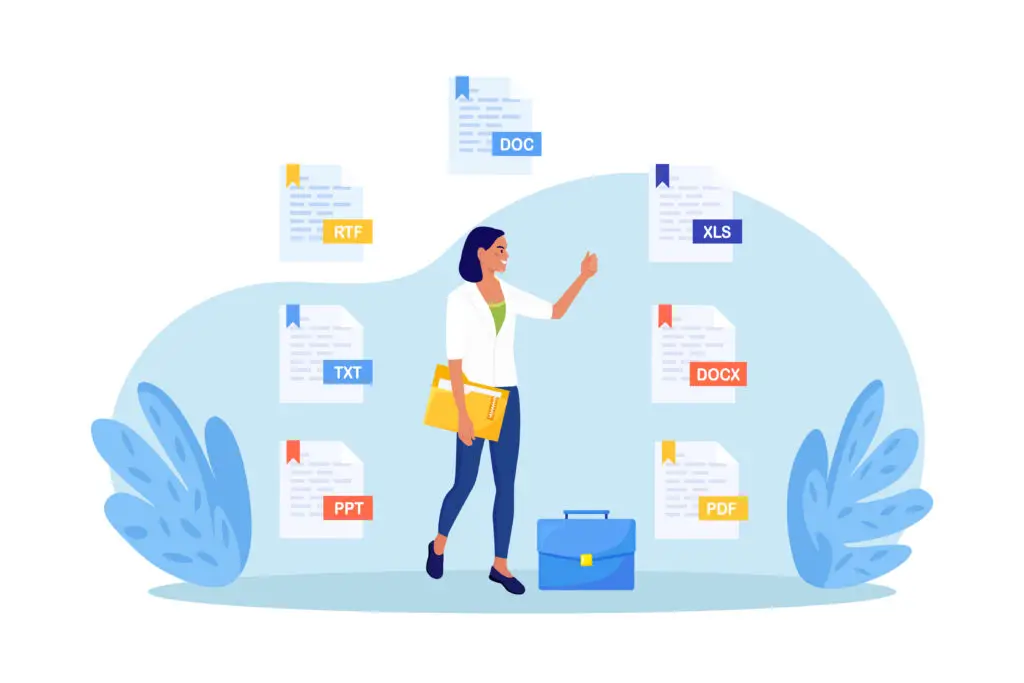From macOS to Windows, Google Docs to Microsoft Office, there’s a multitude of devices and apps out there, powering up businesses and productivity like never before. But dealing with so many operating systems or productivity suites can make sharing documents across these platforms feel like navigating a maze.

Don’t fret though! With every challenge comes an opportunity. There’s an ace up your sleeves: the magic of cross-platform document sharing technology. A key to unlock seamless collaboration, it bridges these technological diversities, empowering your business to stride ahead, unhindered.
The magic of this technology lies in how beautifully it lets you share reports, contracts, project materials – you name it – across different operating systems and software platforms. Like a tech-ninja, it works behind the scenes, fostering collaboration and smoothening out the information sharing process, regardless of what tech your business uses.
Wondering how to get your hands on this exciting piece of tech-wizardry that’ll simplify cross-platform document sharing in your business? Look no further! Whether it’s reaching out to your clients, stakeholders, or remote teams, these strategies are your trusty allies:
1. Research The Different Platforms
The very first mile to conquer is researching – diving deep into understanding the nuts and bolts of operating systems and productivity suites. It’s like getting to know the tools in your toolbox better, especially when the other party is playing with a different set of tools than you are.
As you roll up our sleeves and dive deep into the tech world, focus on the unique features and compatibility standards of different platforms. These little details will teach you how to save and share documents that your intended recipients can open without a hiccup. Learning the ropes of these platforms and how they play ball with different file types is your ticket to stress-free document sharing.
2. Use Online Document Converters
The digital realm is teeming with easy-to-use, affordable document converters that are just a click away. What’s their superpower? The ability to convert a document from its native format into a universally acceptable one, making it accessible to everyone else.
Use a nifty tool such as Foxit Word to PDF Converter to convert business documents to PDF. PDFs are widely used because they ensure the document’s integrity, whether they’re being viewed on an iPhone in sunny California or a Linux workstation in bustling Bangalore. So even if a client uses different operating systems or productivity tools, a seamless sharing experience awaits.
3. Use Cloud Services
There’s an exciting variety of cloud services out there, waiting to catapult your business forward. Dropbox, Google Drive, Microsoft OneDrive are some big names you may have heard of. These cloud services steal the spotlight, breaking the chains that typically bind email attachments so you can send hefty files easily. But the advantages of the cloud don’t stop there. These tools play an absolute blinder in cross-platform sharing.
Cloud computing is platform-agnostic, meaning it isn’t tied to one operating system but rather delivers computing services over the internet. This cool trait guarantees your clients unfettered access to the documents you share, irrespective of their system preferences. Most cloud storage services also come armed with a handy-dandy time machine – file versioning. With it, you can track every alteration in your document and go back to the original version at will.
4. Go For More Accessible Formats When Saving Files
Want people to check out your documents with zero hassle? Consider opting for easily accessible file formats. They’re simple, effective, and can save a ton of headaches.
Let’s paint a picture here. You whip up a stellar document in Adobe Illustrator, save it with a “.ai” extension, and gleefully send it to your client. The plot twist? They don’t have Illustrator. Ouch – potential opportunity down the drain, right? Not quite, because there’s a clever fix!
Consider PDF or TXT. You might say they’re the ‘universal translators’ of file formats. Your clients won’t need to wrestle with complicated software; these files play nice with just about any system. This one tiny tweak opens doors to seamless document access for everyone on your contact list.
5. Use Document Collaboration Tools
The rise of document collaboration tools is nothing short of phenomenal. These nifty technological marvels are absolutely killing it, smashing through barriers and connecting teams across continents and time zones like never before.
Just imagine you’re on Google Docs, for instance. This star player elevates teamwork by granting real-time document access. It’s like witnessing a harmony of edits, updates, and ideas blooming live—an orchestra of collaboration at your fingertips. All you need is a trusty internet connection and an appetite for teamwork.
These mighty collaboration tools are web-based warriors. It doesn’t matter if your team is rocking different devices or operating systems – everyone’s welcome to the party! No need to waste time creating multiple document versions for different devices. Long story short: document collaboration tools are ready to rocket your business productivity into the stratosphere.
6. Keep The Formatting Simple
Let’s talk about an often overlooked, but incredibly crucial part of document sharing – formatting. Embracing minimalism in formatting might seem like a tiny tweak, but it’s a total power move for cross-platform document sharing!
We’ve all stumbled upon those horror stories of documents gone rogue. Picture this: You’ve crafted a sleek Word doc, only for it to appear as incoherent scribbles on your client’s outdated software. Complex diagrams become a maze, dazzling graphics a blur, and special fonts a disaster when viewed on different devices. That’s enough to throw a monkey wrench into that business relationship.
Here’s the secret weapon: lean towards simple and clean formatting. This one masterstroke significantly cuts down the risk of your document turning into a jumbled mess. However, if complexity is integral to your document’s content, loop in universal formats like PDF, which stands its ground, guaranteeing the formatting stays put no matter which device it’s opened on.
Final Thoughts
Harnessing the power of cross-platform document sharing is like finding the master key to effortlessly link an array of devices and productivity suites. These strategies you’ve unearthed serve as your compass, showing the path to unprecedented collaboration.
Efficient and effective document sharing isn’t a cryptic code but an achievable goal – even with a veritable kaleidoscope of devices and systems. And remember, if integrating these strategies into your business starts to feel like a daunting puzzle, don’t sweat it. There’s always a team of stellar experts, just a call away, ready to swoop in with their wisdom.









0 Comments